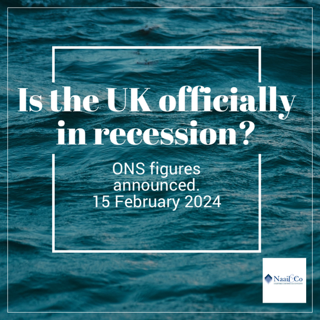Is the UK officially in recession?
As the economic landscape continues to evolve, recent data released by the UK’s Office for National Statistics (ONS) prompts a crucial question: Is the UK officially in recession? Today’s announcement sheds light on the current state of the nation’s economy, providing insights into key indicators and trends that shape this assessment.
Is the UK officially in recession?
The ONS has revealed that the UK’s economy contracted by 0.3% in the fourth quarter of last year, marking the second consecutive quarter of decline. This follows a 0.1% contraction in the third quarter, meeting the technical definition of a recession—a period characterized by two consecutive quarters of negative economic growth.
Factors Contributing to Economic Contraction
Several factors have contributed to the UK’s economic downturn, including ongoing challenges related to the COVID-19 pandemic. Supply chain disruptions, labor shortages, and reduced consumer spending have all exerted pressure on economic activity across various sectors.
The main contributors to the drop-off came from the services sector (0.2%), and manufacturing (1%). The most negatively hit was the construction sector with a 1.3% decline. Nevertheless, the construction industry emerged as the primary driver behind the overall 0.3% decline, experiencing a notable decrease of 1.3%. This underscores the significant impact of elevated interest rates on the sector, resulting in a performance that lagged behind the 0.1% growth observed in the third quarter.
Across the services sector, accounting revenues fell by 12.4% in December to £3.47bn, in comparison with the same period in 2022 when growth was down by 8.2% to £3.52bn. Over the past 12 months, the accounting sector fell 1.6% in terms of revenue.
Furthermore, uncertainties surrounding Brexit, coupled with global geopolitical tensions, have added complexity to the economic landscape, impacting business confidence and investment decisions.
Sectoral Analysis
The latest ONS figures also provide insights into the performance of different sectors within the UK economy:
Services Sector: As the largest contributor to the UK’s GDP, the services sector experienced a modest decline, reflecting subdued consumer demand and restrictions on hospitality and leisure activities due to pandemic-related measures.
Manufacturing and Construction: Both the manufacturing and construction sectors faced significant headwinds, with supply chain disruptions, rising input costs, and labour shortages hampering production and output.
Retail: Retail sales saw a decline in the final quarter of the year, reflecting consumer caution amid inflationary pressures and uncertainties surrounding the economic outlook.
Implications for Businesses and Individuals
The declaration of a recession carries implications for businesses and individuals alike:
- Businesses: Firms across various industries may face heightened challenges, including decreased demand, reduced profitability, and supply chain disruptions. Strategic planning and adaptation to changing market conditions are essential for navigating these uncertain times.
- Consumers: Individuals may experience impacts such as rising prices, reduced purchasing power, and potential job insecurity. Budgeting wisely, prioritizing essential expenses, and exploring opportunities for additional income streams can help mitigate financial strain.
Government Response and Policy Implications
In response to the economic downturn, policymakers may consider implementing measures aimed at stimulating economic growth and supporting businesses and households. These may include fiscal stimulus packages, monetary policy adjustments, and targeted interventions to address specific challenges faced by key sectors.
Conclusion:
The UK’s descent into recession by the conclusion of 2023 was anticipated, given the prevailing cost-of-living crisis that persisted throughout the year. However, the magnitude of the economic downturn exceeds earlier projections. The impact of constrained budgets was evident in December, as subdued consumer spending resulted in retail sales figures plummeting to levels reminiscent of the pandemic-induced lockdowns experienced in January 2021.
Looking Ahead:
While the latest ONS figures indicate a challenging economic environment, they also underscore the resilience and adaptability of the UK economy. As policymakers, businesses, and individuals navigate the road ahead, proactive measures and strategic decision-making will be vital in steering the country towards recovery and sustainable growth.
In conclusion, while the UK’s official entry into a recession poses significant challenges, it also presents opportunities for innovation, resilience, and collaboration across sectors. By leveraging strengths, addressing vulnerabilities, and fostering a conducive environment for investment and growth, the UK can emerge stronger from this period of economic uncertainty.

Our service to you
If you are a self employed, business owner/director of company looking to get your accountancy and taxation matters sorted, look no further. We, at Naail & Co, are pro-active and easily accessible accountants and tax advisors, who will not only ensure that all your filing obligations are up to date with Companies House and HMRC, but also you do not pay a penny more in taxes than you have to. We work on a fixed fee basis and provide same day response to all your phone and email enquiries. We will also allocate a designated accounts manager who would have better understanding of your and business financial and taxation affairs. Book a free consultation call using the link below.
Related pages:
Get further information from the following pages;
Related Blogs:
Get further information from the following blogs;
HMRC raises late payment interest
Inflation rate hits 41 year high of 11.1%
Inflation rate hits 40 year high of 9.4%
Inflation remains at 40-year high
Subscribe to our newsletter
BUSINESS HOURS
Monday – Friday
- 9:00 am – 5:30 pm
Pages:
Menu








